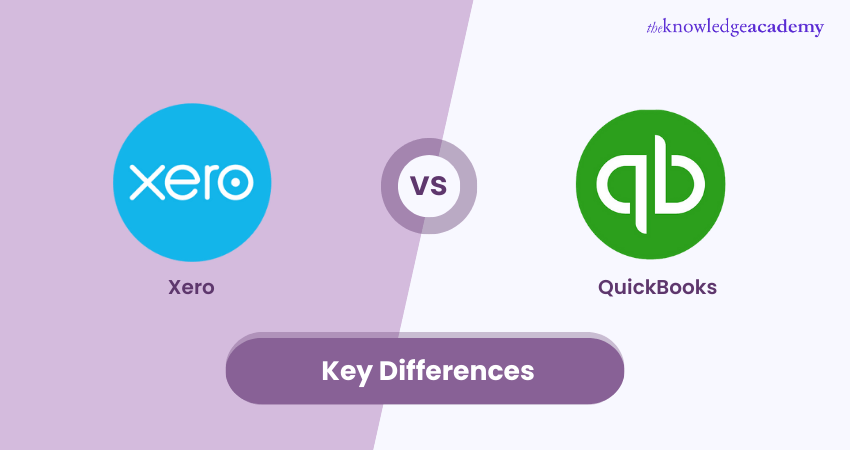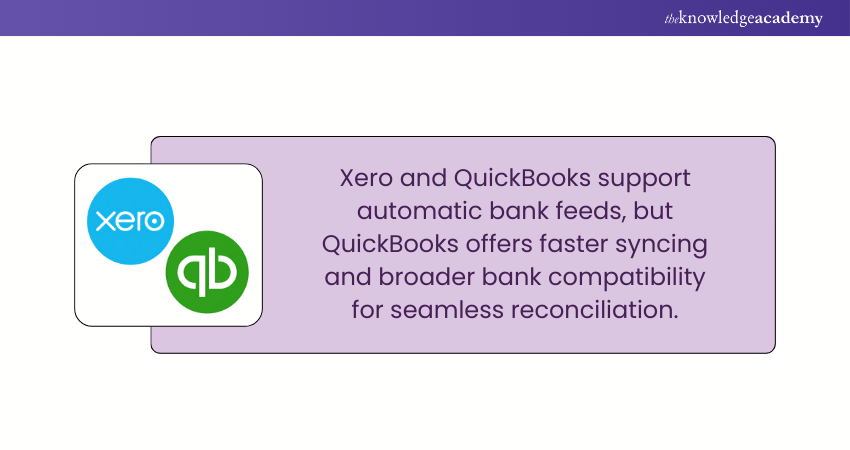We may not have the course you’re looking for. If you enquire or give us a call on +420 210012971 and speak to our training experts, we may still be able to help with your training requirements.
We ensure quality, budget-alignment, and timely delivery by our expert instructors.

When it comes to picking the perfect accounting sidekick, the debate of Xero vs QuickBooks takes centre stage. Both are strong platforms designed to simplify your financial tasks, but each shine in its own way. Xero is a sleek, user-friendly collaborator, perfect for teams who value seamless access and collaboration. QuickBooks, on the other hand, is the seasoned pro, packed with features and tailored solutions to tackle even the most complex accounting needs.
Whether you’re a budding entrepreneur or an established business, the decision boils down to what suits your workflow and goals. In this blog, we dive into the key differences between Xero vs QuickBooks to help you crown your ultimate accounting champion.
Table of Contents
1) What is Xero?
2) What is QuickBooks?
3) Difference between Xero and QuickBooks
4) Xero Pros and Cons at a Glance
5) QuickBooks Online Pros and Cons at a Glance
6) Can I Change From Xero to QuickBooks?
7) How Hard is it to set up Xero?
8) Conclusion
What is Xero?
Xero is a cloud-based accounting software that streamlines financial management for small and medium-sized businesses. It offers several features like invoicing, expense tracking, payroll, and bank reconciliation, all in an intuitive, user-friendly package. One of Xero’s standout perks is its unlimited user access, making it effortless for teams to collaborate on finances.
Its seamless integration with over 1,000 third-party apps, from inventory management to e-commerce tools, sets Xero apart. Automated processes and real-time updates take the hassle out of handling finances so you can concentrate on growing your business. Whether you’re at your desk or on the go, Xero makes accounting feel less like a chore and more like a streamlined part of your workflow.
What is QuickBooks?
QuickBooks is a popular Accounting Software built to help companies of all sizes stay on top of their finances. Whether you’re a freelancer, a small business owner, or part of a larger company, QuickBooks has tools for invoicing, expense tracking, payroll, tax filing, and much more. It lets you quickly generate financial reports, track cash flow, and manage your sales—all in one place.
What really makes QuickBooks stand out is its flexibility. It offers different versions tailored to specific industries, plus tons of integrations with other apps to suit your unique business needs. And since it’s cloud-based, you can manage your finances from anywhere, which makes it an excellent choice for businesses looking for a reliable and scalable solution.
Streamline your accounting with our QuickBooks Training and grow your business today!
Difference Between Xero and QuickBooks
Xero and QuickBooks are both strong options. Here's a detailed breakdown of the two, helping you decide which one fits your needs:
1) Bank Feed Functionality
Xero and QuickBooks offer bank feed integration, allowing you to import bank transactions automatically. QuickBooks excels in this area with faster syncing and broader bank connections, ensuring smoother reconciliation. Xero also offers bank feed capabilities but may require manual setup for certain banks, making QuickBooks a more seamless option for users with various bank accounts.

2) Recording Transactions
QuickBooks simplifies transaction recording with features like automated categorisation, batch transaction uploads, and easy matching of bank transactions. Xero offers similar functionality, but its transaction entry process is slightly manual and may require more user intervention. QuickBooks provides a smoother, faster approach to recording day-to-day transactions.
3) Reporting Capabilities
QuickBooks offers extensive reporting tools, including industry-specific reports and advanced customisation options. It allows businesses to generate detailed financial statements and track key metrics. Xero’s reporting tools are robust but generally considered more straightforward. While it offers comprehensive financial reports, it may not have as many advanced or customisable options as QuickBooks.
4) Initial Cost
Xero tends to be more affordable upfront, offering competitive pricing for its core plans. While providing various pricing tiers, QuickBooks generally carries a higher initial cost, especially for businesses that need more advanced features like payroll or custom reporting. Xero’s pricing structure may appeal more to smaller companies or startups looking for a cost-effective solution.
5) Handling Sales Tax Returns
Both Xero and QuickBooks handle sales tax returns, but QuickBooks offers more advanced tools for tax reporting. It allows automatic tax calculations based on your location and makes filing returns easier with built-in forms for various regions. Xero also offers tax return features but may require more manual setup or third-party integrations for specific jurisdictions.
6) Comprehensive Accounting Features
QuickBooks provides more comprehensive accounting tools, especially for larger businesses. It includes features like advanced reporting, job costing, and industry-specific solutions. Xero offers a solid suite of accounting features. Still, it may lack the depth of QuickBooks in areas like job costing and specialised industry tools, making QuickBooks a better option for more complex accounting needs.
7) Management of Inventory
QuickBooks excels in inventory management, offering detailed tracking, automated updates, and integration with various sales platforms. It is ideal for businesses with complex inventory needs. Xero provides basic inventory tracking features, which may be sufficient for smaller companies, but lacks some of the advanced tools found in QuickBooks for more comprehensive inventory management.
8) Customer Support Services
QuickBooks provides robust customer support options, including live chat, phone support, and a comprehensive help centre. However, some users report longer wait times for phone support during peak hours. Xero offers solid support, with a responsive help centre and online chat, but may not have as extensive support options as QuickBooks, particularly for urgent queries.
9) Payroll Functionality
QuickBooks offers a fully integrated payroll solution, including automatic tax calculations, direct deposit, and the ability to manage employee benefits. Although Xero also provides payroll functionality, it is not as extensive as QuickBooks, especially for businesses with complex payroll needs. Xero’s payroll is available only in certain regions, while QuickBooks supports a broader range of locations.
Ready to streamline your finances? Get the full QuickBooks Guide today!
Xero Pros and Cons at a Glance
Here is a list of Pros and Cons of Xero:
Pros
a) Unlimited users across all pricing plans
b) Integrates with over 1,000 third-party apps
c) It includes a robust mobile app, a comprehensive reporting suite, invoicing features, and automated bill and receipt capture through Hubdoc
d) Simple, user-friendly layout
Cons
a) No phone support is available
b) The entry-level plan restricts bills and invoices to five and 20 per month, respectively
QuickBooks Online Pros and Cons at a Glance
Here is a list of Pros and Cons of QuickBooks:
Pros
a) Easy to share information with your accountant and access QuickBooks experts and online resources
b) Over 750 app integrations, including in-house bookkeeping
c) Comprehensive feature set with excellent record-keeping, reporting, invoicing, inventory management, and a user-friendly mobile app
d) Daily phone support and 24/7 chat support across all plans
Cons
a) More expensive than many competing solutions
b) Limits on the number of account users per plan
Can I Change from Xero to QuickBooks?
Yes, you can switch from Xero to QuickBooks. The process involves exporting your data from Xero and importing it into QuickBooks. However, working with a professional is recommended to ensure accurate data transfer.
How Hard is it to set up Xero?
Setting up Xero is relatively easy, thanks to its user-friendly interface and guided setup process. Most small businesses can get started quickly, though some may require assistance for more complex features like payroll or tax settings.
Download the QuickBooks Shortcuts PDF and make your accounting tasks faster and easier!
Conclusion
When it comes to Xero vs QuickBooks, both platforms bring their A-game to the table. QuickBooks offers a powerhouse of features, ideal for companies with intricate needs and a desire for robust support. Xero, however, stands out for its simplicity, affordability, and unlimited user access, making it a perfect fit for growing teams. The decision boils down to your unique business goals.
Ensure timely financial tracking by signing up for our Xero Introduction Training now!
Frequently Asked Questions
Which Industry Uses QuickBooks the Most?

QuickBooks is widely used across various industries, with accounting, retail, and construction being the most prominent. Its versatility makes it suitable for businesses in finance, hospitality, manufacturing, and professional services.
What is QuickBooks Customer Distribution Based on Company Size?

QuickBooks serves businesses of all sizes, with a significant portion of its customers being small businesses. It also caters to mid-sized and larger companies, offering scalable solutions to meet diverse operational needs.
What are the Other Resources and Offers Provided by The Knowledge Academy?

The Knowledge Academy takes global learning to new heights, offering over 3,000 online courses across 490+ locations in 190+ countries. This expansive reach ensures accessibility and convenience for learners worldwide.
Alongside our diverse Online Course Catalogue, encompassing 19 major categories, we go the extra mile by providing a plethora of free educational Online Resources like News updates, Blogs, videos, webinars, and interview questions. Tailoring learning experiences further, professionals can maximise value with customisable Course Bundles of TKA.
What is The Knowledge Pass, and How Does it Work?

The Knowledge Academy’s Knowledge Pass, a prepaid voucher, adds another layer of flexibility, allowing course bookings over a 12-month period. Join us on a journey where education knows no bounds.
What are the Related Courses and Blogs Provided by The Knowledge Academy?

The Knowledge Academy offers various Accounting Software Training, including the Xero Introduction Training. These courses cater to different skill levels, providing comprehensive insights into Crisis Management Tools.
Our Accounting and Finance Blogs cover a range of topics related to Web Development, offering valuable resources, best practices, and industry insights. Whether you are a beginner or looking to advance your Accounting Skills, The Knowledge Academy's diverse courses and informative blogs have got you covered.
Upcoming Accounting and Finance Resources Batches & Dates
Date
 QuickBooks Training
QuickBooks Training
Fri 9th May 2025
Fri 11th Jul 2025
Fri 12th Sep 2025
Fri 14th Nov 2025






 Top Rated Course
Top Rated Course



 If you wish to make any changes to your course, please
If you wish to make any changes to your course, please


